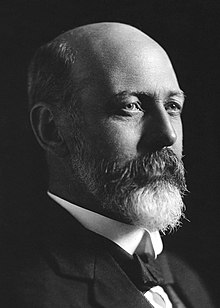Sir Joseph Cook | |||||||||||||||||||||||||||||||||||||||||||
|---|---|---|---|---|---|---|---|---|---|---|---|---|---|---|---|---|---|---|---|---|---|---|---|---|---|---|---|---|---|---|---|---|---|---|---|---|---|---|---|---|---|---|---|
 Cook, c. 1914 | |||||||||||||||||||||||||||||||||||||||||||
| 6th prime minister of Australia | |||||||||||||||||||||||||||||||||||||||||||
| In office 24 June 1913 – 17 September 1914 | |||||||||||||||||||||||||||||||||||||||||||
| Monarch | George V | ||||||||||||||||||||||||||||||||||||||||||
| Governors General | Lord Denman Sir Ronald Munro Ferguson | ||||||||||||||||||||||||||||||||||||||||||
| Preceded by | Andrew Fisher | ||||||||||||||||||||||||||||||||||||||||||
| Succeeded by | Andrew Fisher | ||||||||||||||||||||||||||||||||||||||||||
| Leader of the Opposition | |||||||||||||||||||||||||||||||||||||||||||
| In office 8 October 1914 – 17 February 1917 | |||||||||||||||||||||||||||||||||||||||||||
| Prime Minister | Andrew Fisher Billy Hughes | ||||||||||||||||||||||||||||||||||||||||||
| Preceded by | Andrew Fisher | ||||||||||||||||||||||||||||||||||||||||||
| Succeeded by | Frank Tudor | ||||||||||||||||||||||||||||||||||||||||||
| In office 20 January 1913 – 24 June 1913 | |||||||||||||||||||||||||||||||||||||||||||
| Prime Minister | Andrew Fisher | ||||||||||||||||||||||||||||||||||||||||||
| Preceded by | Alfred Deakin | ||||||||||||||||||||||||||||||||||||||||||
| Succeeded by | Andrew Fisher | ||||||||||||||||||||||||||||||||||||||||||
| In office 26 November 1908 – 26 May 1909 | |||||||||||||||||||||||||||||||||||||||||||
| Prime Minister | Andrew Fisher | ||||||||||||||||||||||||||||||||||||||||||
| Preceded by | George Reid | ||||||||||||||||||||||||||||||||||||||||||
| Succeeded by | Alfred Deakin | ||||||||||||||||||||||||||||||||||||||||||
| Deputy Leader of the Opposition | |||||||||||||||||||||||||||||||||||||||||||
| In office 1 July 1910 – 20 January 1913 | |||||||||||||||||||||||||||||||||||||||||||
| Leader | Alfred Deakin | ||||||||||||||||||||||||||||||||||||||||||
| Preceded by | Gregor McGregor | ||||||||||||||||||||||||||||||||||||||||||
| Succeeded by | John Forrest | ||||||||||||||||||||||||||||||||||||||||||
| In office 26 May 1909 – 2 June 1909 | |||||||||||||||||||||||||||||||||||||||||||
| Leader | Alfred Deakin | ||||||||||||||||||||||||||||||||||||||||||
| Succeeded by | Gregor McGregor | ||||||||||||||||||||||||||||||||||||||||||
| |||||||||||||||||||||||||||||||||||||||||||
| |||||||||||||||||||||||||||||||||||||||||||
| High Commissioner to the United Kingdom | |||||||||||||||||||||||||||||||||||||||||||
| In office 11 November 1921 – 10 May 1927 | |||||||||||||||||||||||||||||||||||||||||||
| Preceded by | Andrew Fisher | ||||||||||||||||||||||||||||||||||||||||||
| Succeeded by | Granville Ryrie | ||||||||||||||||||||||||||||||||||||||||||
| |||||||||||||||||||||||||||||||||||||||||||
| Personal details | |||||||||||||||||||||||||||||||||||||||||||
| Born | Joseph Cooke 7 December 1860 Silverdale, Staffordshire, England | ||||||||||||||||||||||||||||||||||||||||||
| Died | 30 July 1947 (aged 86) Bellevue Hill, New South Wales, Australia | ||||||||||||||||||||||||||||||||||||||||||
| Resting place | Northern Suburbs Crematorium, Sydney | ||||||||||||||||||||||||||||||||||||||||||
| Political party | Labor (until 1894) Independent (1894) Free Trade (1894–1909) Commonwealth Liberal (1909–1917) Nationalist (from 1917) | ||||||||||||||||||||||||||||||||||||||||||
| Spouse | |||||||||||||||||||||||||||||||||||||||||||
| Children | George Sydney Cook Albert Cook Joseph William Cook John Hartley Cook Annette Margaret Cook Winifred Emmie Cook Richard Cecil Cook Constance Mary Cook Raymond Fletcher Cook | ||||||||||||||||||||||||||||||||||||||||||
| Parents |
| ||||||||||||||||||||||||||||||||||||||||||
| Occupation | Coal miner, trade unionist | ||||||||||||||||||||||||||||||||||||||||||
Sir Joseph Cook GCMG (7 December 1860 – 30 July 1947) was an Australian politician and trade unionist who served as the sixth prime minister of Australia from 1913 to 1914. He held office as the leader of the Liberal Party, having previously been leader of the Anti-Socialist Party from 1908 to 1909.[1] His victory at the 1913 election marked the first time that a centre-right party had won a majority at an Australian federal election.[2]
Cook was born in Silverdale, Staffordshire, England, and began working in the local coal mines at the age of nine. He emigrated to Australia in 1885, settling in Lithgow, New South Wales. He continued to work as a miner, becoming involved with the local labour movement as a union official. In 1891, Cook was elected to the New South Wales Legislative Assembly as a representative of the Labor Party, becoming one of its first members of parliament. He was elected party leader in 1893, but the following year left Labor due to a disagreement over party discipline. He was then invited to become a government minister under George Reid, and joined Reid's Free Trade Party.
In 1901, Cook was elected to the new Federal Parliament representing the Division of Parramatta. He became deputy leader of the federal Free Trade Party (later renamed the Anti-Socialist Party), again under George Reid, and in 1908 replaced Reid as party leader and Leader of the Opposition. In what became known as "the fusion", Cook agreed to merge his party with Alfred Deakin's Protectionist Party in 1909, forming a unified anti-Labor party for the first time. He became deputy leader of the new Liberal Party, allowing Deakin to become prime minister again, and was Minister for Defence until the government's defeat at the 1910 election.
Cook replaced Deakin as leader of the Liberals in January 1913, and a few months later won a one-seat majority over Andrew Fisher's Labor Party at the 1913 election. His party failed to secure a majority in the Australian Senate, making governing difficult, and as a result he engineered the first double dissolution. A new election was called for September 1914, at which the Liberals lost their majority; Fisher returned as prime minister. Cook was unable to pass much legislation during his time in office, but did oversee the early stages of Australia's involvement in World War I. He subsequently became Leader of the Opposition for a third time.
In 1917, Cook was involved in a second party merger, joining the Liberals with Billy Hughes's National Labor Party to form the Nationalist Party. He became the de facto deputy prime minister under Hughes, serving as Minister for the Navy (1917–1920) and Treasurer (1920–1921). He was a delegate to the 1919 Paris Peace Conference, where he was a member of the committee that determined the borders of Czechoslovakia, and along with Hughes was one of two Australians to sign the Treaty of Versailles. After leaving politics, Cook was High Commissioner to the United Kingdom from 1921 to 1927. He died at the age of 86 as one of the last survivors of the first federal parliament.
- ^ "Prime Facts 19" (PDF). Old Parliament House. The Australian Prime Ministers Centre. Archived from the original (PDF) on 5 September 2012. Retrieved 10 January 2008.
- ^ Gorman (2023), Joseph Cook, p.12.